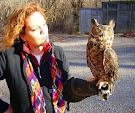****************************
An interesting forum was begun on the Bird Education Network's email list. Laura Erickson and others said this to say:
~~~~~~~~~~~~~~~~~~~~~~
I would hope we would never demonize any animal, however at the same time we can not sugar coat the facts. Too many irresponsible persons are out there with the idea that "as long as I feed them well these cute little kitties won't hurt anybody." The science simply does not bare that out.
~~~~~~~~~~~~~~~~~~~~~~~~
People often seem to romanticize the "adventures" their kitty gets into, and the "natural" predator role their kitty plays when killing birds and mice, even as they decry Great Horned Owls, foxes, coyotes, and other natural predators for including their kitty in the food chain. People who really want to help outdoor cats should be searching for homes for them. I keep hearing people say that some truly feral cats don't adapt to the indoors. But, ecologically, they don't adapt to the outdoors, either. Because these societies keep bringing new feral cats to the colonies and subsidizing them with food, the cats don't die out as natural predators do when their numbers are higher than local small mammal and bird populations can support. They're quite literally subsidized killers.~~~~~~~~~~~~~~~~~~~~~~~~
~~~~~~~~~~~~~~~~~~
And none of this takes into account the toxoplasmosis that cats toying with birds usually carry, and how dangerous cat feces, and runoff from them, are to some marine mammals.
~~~~~~~~~~~~~~~~~
But the way to appeal to cat lovers isn't to try to turn them against cats, which is impossible. It's to appeal to their feelings towards birds. People as a rule are shockingly ignorant about wild birds--bringing especially vulnerable species like Piping and Snowy Plovers to the forefront in our discussions of cats, and showing adorable photos of the babies, stressing that they're flightless for a full month after hatching, provides a more engaging platform for discussion.
~~~~~~~~~~~~~~~~~~~~~~~~~~~~~~~~~~~~
Duluth, Minnesota, adopted a cat leash law several years ago. What finally convinced both the City Council and enough citizens was the evidence provided not by ornithologists but by veterinarians and the county health department.

1 comment:
Good for people to know.
Post a Comment